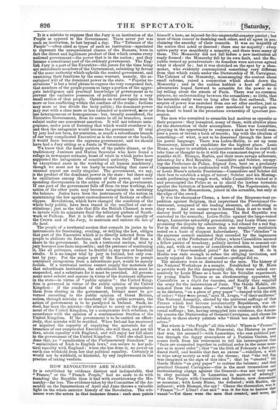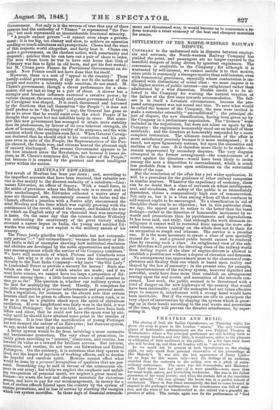HOW REVOLUTIONS ARE MANAGED.
IT is established by evidence distinct and indisputable, that "France," or the "French People," had no more to do with founding the Republic than it had with overthrowing the Mo- narchy—far less. The evidence taken by the Committee of the As- sembly on the Insurrections of April and June throws a valuable light on the whole anterior history of the Revolution. The wit- nesses were the actors in that immense drama : each man paints
himself a hero, an injured-by-his-ungrateful-country patriot ; but most of them concur in damning each other, and all agree in pro- himself a hero, an injured-by-his-ungrateful-country patriot ; but most of them concur in damning each other, and all agree in pro- claiming the anarchy of their councils. It was no majority of
the nation that acted or decreed : there was no majority : every active party was manifestly a minority, and there were many of
them. The Monarchy did not fall before a new institution all ready formed: the Monarchy fell by its own fault, and the Re- public turned up peradventure : its founders were not even agreed what it should be ; but it was sketched on the spot by a shoe-
maker, who evidently contemplated something very different from that which exists under the Dictatorship of M. Gavaignac.
The Cabinet of the Monarchy, mismanaging the contest about small reforms, raised a commotion which shook down the Monarchy ; and in the sudden hubbub a host of political adventurers leaped forward to scramble for the power as it lay rolling about the streets of Paris. There was no common purpose, no understanding between the scramblers ; so little, that the scramble really went on long after the first outbreak. The sceptre of power was snatched from one set after another, just as the valuables of an European crew murdered by savages pass from hand to hand in the precarious ownership of ignorant pos- session.
The men who conspired to scramble had motives as opposite as their purposes : they conspired, many of them with ulterior plans
for the destruction of their accomplices. There was Lamartine, glorying in the opportunity to compose a state as he would com- pose a poem or invent a book of travels ; big with the idealism of something—of what, is not to be discerned through the haze of his poetic language. There was Ledru.-Rollin, to set up mere Democracy, himself a candidate for the highest place. Louis Blanc, so eager to establish a cooperative model that he could not take time or thought to do it with the commonest degree of work. manlike skill. Blanqui, Barbes, and their more savage adherents, labouring for a Red Republic. Caussidiere and Sobrier, occupy- ing the Prefecture de Police, feigned foes, bent on a predatory Communism not to be confounded with Proudhon's rigid theories or Louis Blanc's eclectic Fourierism—Caussidiere and Sobrier did their best to establish a reign of terror • Sobrier and his Montag- nerds performing the rough work, while Caussidiere winked at it
and preoccupied the Police so as to shield the lawless terrorists against the visitation of hostile authority. The Napoleonists, the Legitimists, the Monarchists, joined in the scramble, but only at the edge of the crowd.
It was the shoemaker Chenu, a hero of the Risquons-tout ex- pedition against Belgium, that improvised the Provisional Go- vernment, composed of the leading elements, all conflicting as they were. And no sooner was it formed than it set to work to destroy itself by internal antagonism. The Red Republic was contested in the councils; Ledru-Rollin against the large-voiced Arago, Lamartine splendidly generalizing, and. Louis Blanc com- promising the dispute by substituting a red riband for a red flag. For in that stirring time more than one transitory institution rested on a basis of eloquent haberdashery. The "shindies "in the supreme council emulated that recorded by the ingenuous M. Chenu, at the Prefecture of Police ; where Caussidiere accused a fellow patriot of treachery, politely invited him to commit sui- cide, and, with an excess of considerate attention, tendered the loan of a "four-barrelled pistol" for the purpose. M. de is Hodde was rude enough to refuse the obliging invitation, and nearly enjoyed the honour of murder—perhaps did so. The measures were as distracted as the men. The history of the National Workshops is a sample. Established by M. Marie to provide work for the dangerously idle, they were seized suc- cessively by Louis Blanc as a basis for his Socialist experiment, by young Emile Thomas as an electioneering apparatus, by Caussidiere as a depot for emeutes, and finally they.supplied the army for the insurrection of June. The Garde Mobile, eli- minated from the same class—" created" by M. de Lamartine, as he declares, "on a piece of grey paper "—ranged with the side of order : "they were proud," says M. Arago, "of their uniforms." The National Assembly, elected by the universal suffrage of that France which had become involuntarily Republican, was ob- structed by the "Democrats," who tried to tamper with the uni- versal suffrage ; but, having struggled into existence, the Assem- bly creates the Dictatorship of General Cavaignac, and cheers his rebukes to those showy patriots who "think too much of them- selves."
But where is "the People" all this while? Where is "France"? Was it with Ledru-Rollin, the Democrat, the Dictator in posse
that was, the accused 1—with Lamartine, who sees political par-
ties through the foggy atmosphere of a Parisian Ossian, and comes forth from his retirement to tell his interrogators that
"facts are connected together in political order in the same man- ner as in moral order"; that "on the 25th of February a fact pro- duced itself, and besides that fact an excess "—videlicet, a wish
to wipe away society as well as the throne- that "the red deg was imagined as the sign of this idea" ; that he "created" the Garde Mobile "on grey paper" to redress the balance; and that practical General Cavaignac—this is the most tremendous and incriminating charge against the General—was not very eager, to obey poetical M. de Lamartine in matters of strategy ! Was the People with Caussidiere and Sobrier, now denounced as assassins ; with Louis Blanc, the defeated ; with Barbes, the inflamed ; with Blanqui, the spy ? Chenu the shoemaker, was he "France "?—" L'etat I c'est moi" was it for hint to borrow thm vaunt'—Yet these were the men that created, and were, the Government. Not only is it the reverse of true that any of these persons had the authority- of " France " or represented "the Peo- ple," but each represented an inconsiderable fractional minority.
"A people cannot govern "—it cannot even shape a govern- ment: it is too big, too clumsy and slow, to achieve an operation needing so much adroitness and promptitude. Chenu had the start of this majestic world altogether, and fairly beat it. Chenu can make a government, on the shortest notice, with punctuality and despatch ; quicker than he can turn out a pair of shoes to order. The man whose boots he was to have sent home that 25th of February was fain to fight in old boots, and got his feet wetted ; but M. Chenu gave France its Provisional Government on de- mand. Now France could not have done that for itself.
However, there is a sort of "appeal to the country." These hastily-cobled governments, if they do not fit the notion of the people and receive a tolerably wide sanction, do not stand. M. Chenu's government, though a clever performance for a shoe- maker, did not last so long as a pair of shoes. A slower but a stronger and broader influence exercised a creative power ; by various changes, the more steady and potent government of Gene- ral Cavaignac was shaped. It is much threatened and harassed by the fractions that call themselves "the People"; it does not itself profess to be "the People "; nay, the General has gone so far as to avow that he would resist even the whole People if he thought that august but not infallible body in error. But some- how this new government has managed to attain more stability than its predecessors, by favour of its own inherent strength, its show of honesty, the seeming reality of its purposes, and the wide sanction which those qualities earn for it. When General Cavaig- nac declared that he should stick to his conviction and his pur- pose even in spite of the People, the Representatives of the Peo- ple cheered, the funds rose, and citizens heaved the pleasant sigh of anxiety discharged. The present Government appears to be the best attained since the Revolution, not because it issues de-. crees, as M. Chenu's nominees did, "in the name of the People," but because it is created by the greatest and most intelligent power within the nation.



























 Previous page
Previous page